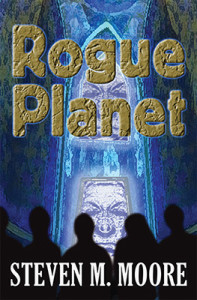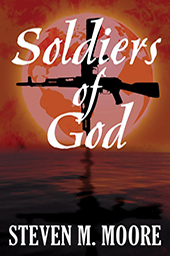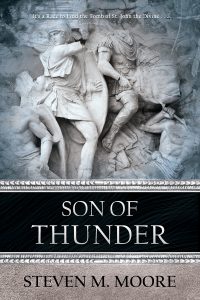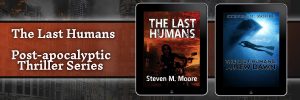“Inspiring Songs” series #3: “Onward Christian Soldiers”…
[Note from Steve: If you’ve downloaded “Mayhem, Murder, and Music,” the free collection of short crime fiction—see the “Free Stuff & Contests” web page if you haven’t—you know that music often inspires me. It’s always been part of my life. I even attempted once to write a Broadway-style musical based on Huxley’s Ape and Essence (it’s now shredded—I didn’t get much further than a rousing march, “Seventy-Six Trombones” in an apocalyptic setting). This series of posts was also inspired by music. I might even repeat some of the songs from that collection! Enjoy.]

No matter our religious preferences (or lack thereof), Hollywood, at least in old westerns’ prairie churches, exposed us to the old hymns that resounded from sea to shining sea. Of course, there might be a saloon not far from the church where evil booze turned cowboys into warring gladiators. In many ways, this made mock of a serious issue, an existential problem human beings have often faced on planet Earth and may very well carry to the stars (see my novel Rogue Planet): How religious belief can breed the extreme violence when believers become fanatics.
It always seemed to me that this familiar juxtaposition of religion and violence, well-summarized by even the title of the hymn indicated above, was a telling indictment of human failings (the Taliban in Afghanistan is but one obvious example). Early on (at least by junior high—middle school for easterners), I’d realized the dichotomy was ubiquitous throughout our world. It’s extremes can be seen in the Nazi holocaust and other genocides, tribalism that can tear a society apart. It often amounts to “Believe as I do, or die!” In other words, religious fanaticism.

And it isn’t just restricted to murdering fanatics either. America’s fascists count radical evangelicals and right-wing Catholics among them (we now even have a few on our Supreme Court). These are people who might seem normal but hold extreme views. QAnon is basically a radical Christian cult. Scratch a militant male from the SBC VIPs and you’ll find a Taliban fanatic, including the belief that women are the property of their men and have no rights at all.
Religion has its place as a comfort to many; extremism doesn’t . But like many other critical themes, I haven’t treated it very often. Terrorism, its extreme form, yes; but the religious extremism that leads to that terrorism, rarely. There’s one novel, though, where I tried to strike a blow against religious fanaticism: Soldiers of God.
The novel’s title was motivated by that old Calvinist hymn of the title that might as well be the militant march of Christian fanatics. Three fanatical religious groups appear in the novel. An FBI agent and a socially conscious priest (obviously not a part of the Vatican hierarchy) battle one group in particular, but the villain of the story, a precursor of Mr. Trump, if you will, uses religious fanatics to further his own agenda. That’s the message: Fanatics all too often become the political tools of despots. We’re seeing this today, so, in that sense, the novel, like our present situation, is a prescient prelude to the apocalypse. (The book provides a bridge between the “Clones and Mutants Trilogy” and the “Chaos Chronicles Trilogy.” It’s a sci-fi thriller that just might be too close to our present reality.)

In a previous post in this series, I considered unrequited love. I misspoke by saying there that I have no novels that contain that theme. The FBI agent’s love for her priest who works undercover in the fanatical group certainly qualifies as unrequited. This makes the novel stronger, of course, contrasting true love against the Christian fanatics’ hatred.
If I had to choose my two best and most profound books, I might choose Soldiers of God and Son of Thunder. (Yes, thrillers can be profound!) Both feature the clash between good and evil with religious overtones. For that reason, I see both novels as an analysis of how human belief systems can generate violence. Perhaps the first novel reflects more the vengeful God of the Old Testament, He who inspires fanatics, while the second reflects the more loving God of St. John, He who disapproves of fanatical mayhem and violence in His name. Keep that in mind when you read those novels.
***
Comments are always welcome.

“The Last Humans” series. I wrote the first novel in this series, The Last Humans, before the real Covid pandemic. The plague here is bioengineered by an American enemy and is delivered to the West Coast of the US via missile. But we all know from the experiences with those California wildfires that small particles, here the virus, can be carried across the US and to the rest of the world by prevailing winds. Penny Castro, forensic diver for the LA County Sheriff’s department, dives to recover a corpse and emerges to find apocalyptic desolation. The first novel is her story of survival. The second, The Last Humans: A New Dawn, is the story of a US-sponsored revenge mission that goes terribly wrong for Penny. (Fair warning: The idiotic Amazon bots—or the idiots who program them?—confused these two novels, so I’d recommend buying the two books elsewhere. Barnes & Noble, for example, where the links take you, kept them straight. The first novel was a bestseller from Black Opal Books at B&N for a bit, in fact.)
Around the world and to the stars! In libris libertas!
